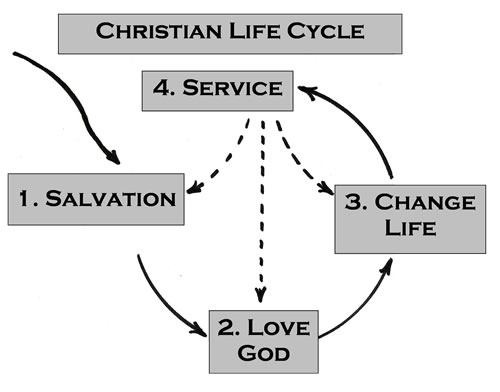Hebrews 6:7-12
POINTS:
- Your
response to circumstances reflects an underlying condition of your heart.
- Your
response then generates the appropriate and inevitable retribution.
6:7
“Land that drinks in the rain often falling
on it and that produces a crop useful to those for whom it is farmed receives
the blessing of God.”
γη γαρ η πιουσα τον επ αυτης πολλακις ερχομενον υετον
earth for drinking the
upon it often coming rain
και τικτουσα βοτανην ευθετον εκεινοις δι ους
and
bearing fodder suitable for those on accont
whom
και γεωργειται μεταλαμβανει ευλογιας απο του θεου
indeed
it is farmed
receives
blessing from God
Key to understanding this is to know that your response to your
circumstances reflects an underlying condition.
The rain is not the source of the seeds. The rain just causes the seeds to spring
forth.
The sun can melt wax or harden clay. If a substances melts or hardens is not
determined by the sun but by the material the sun shines on.
So are our hearts.
6:8
“But land that produces thorns and
thistles is worthless and is in danger of being cursed. In the end it will be burned.”
εκφερουσα δε ακανθας και τριβολους αδοκιμος και
καταρας εγγυς ης το τελος εις καυσιν
Examples
of False Believers:
1) Simon Magus was baptized (Acts 8:13)
2) Demas was involved in Christian work (2 Tim. 4:9-10)
3) Judas was involved with healing, casting out demons
(Mark 6:12; Matt. 10:5)
Isaiah’s
example of
This
fire is not a fire of cleansing but of judgment
6:9
“Even though we speak like this, dear
friends, we are confident of better things in you case – things that accompany
salvation.”
πεπεισμεθα δε περι υμων αγαπητοι τα κρεισσονα
και εχομενα σωτηριας ει και ουτως λαλουμεν
“Even though we speak
like this” indicates
that the previous argument was hypothetical in its application to the readers.
The author of this book does not think his readers are lost.
In fact, he believes they are saved. He doesn’t even think they are close.
(Remember: 5:11, 12 “you”; 6:1 is “us”; 6:3 is “we”; 6:4 is “those”)
He also believes they are more like verse 6:7 than 6:8
In verse 6:10 he believes they have done deeds worthy of reward.
He does fear they have backed away due to fear, opposition, etc.
“things that accompany
salvation” would NOT be getting burned like thorns and
thistles. Instead “things that accompany
salvation” would be:
- growth
- discipline
- production
- reward
These things are all part of the Christian life. The saved person is not in danger of being
burned with fire.
6:10
“God is not unjust; he
will not forget your work and the love you have shown him as you have helped
his people and continue to help them.”
ου γαρ αδικος ο θεος επιλαθεσθαι του εργου υμων
και του κοπου της αγαπης ης ενεδειξασθε
εις το ονομα αυτου διακονησαντες τοις αγιοις
“word” did not cause salvation but was a result of salvation.
Notice the Cycle of Christian Life:
- Salvation - Saved
in verse 6:9
- Service - Helped
and continue to help his people (6:10)
- Changed Life –
“Work” indicates Christian character
- Love God – Love for God indicates a knowledge of
God

6:11
“We want each of you to show
this same diligence to the very end, in order to make your hope sure.”
επιθυμουμεν δε εκαστον υμων την αυτην
but we desire each one of you the same
ενδεικνυσθαι σπουδην προς την πληροφοριαν της
to show eagerness to the full assurance of the
hope unto the end
“Same diligence to the very end” means they will have to
continue to run in the
- Learning of God
- Clothing
themselves with Christ
- Serving people
If they drift away in their knowledge or their application they
will drift back toward Judaism.
πληροφοριαν
“Plerophorian” means “full
assurance”. It is used four times in the
GNT (Greek New Testament):
- Colossians 2:2
- 1 Thessalonians
1:5
- Hebrews 6:11
- Hebrews 10:22
The idea here is not that they will secure their salvation by
doing these things but they will be fully assured and realize their full
potential. A believer who is focused on
growth and production with run the Christian race correctly. A believer who is not growing and drifting
away forgets their status of being in Christ and begin to live aimlessly.
In 5:11 these believers started to drift from learning the word
of God (“you are slow to learn”). The
result was fragmented understanding of God and his plan. They had then become confused believers
tempted to turn away from Christianity and execute improper living.
6:12
“We do not want you to
become lazy, but to imitate those who through faith and patience inherit what
has been promised.”
ινα μη νωθροι γενησθε μιμηται δε των
lest dull,
sluggish you become imitators of the
δια πιστεως και μακροθυμιας κληρονομουντων
through
faith and long-suffering inheriting
the promises
“Lazy” means “sluggish” and is the same word
as 5:11 “slow to learn” (“nwqroi”
which means “dull, slow, sluggish”)
“Imitate” μιμηται “mimetai” (where we get our word
“mimic”) refers to watching how the “winners” in Christian living and values
live.
We all “mimic” someone.
We need to purposely chose good examples.
Chapter 11 of Hebrews will give a good list to start with.
The winners are going to have:
- “Faith” – from an
understanding of God’s Word
- “Patience” – which
is the application of Christ-likeness to their lives
- Result – “Inherit what has been promised” which is rewards for service.
“Inherit” κληρονομουντων
present active means you
are active in “inheriting” now. These
believers are currently in the process of receiving the promises of and with
salvation.